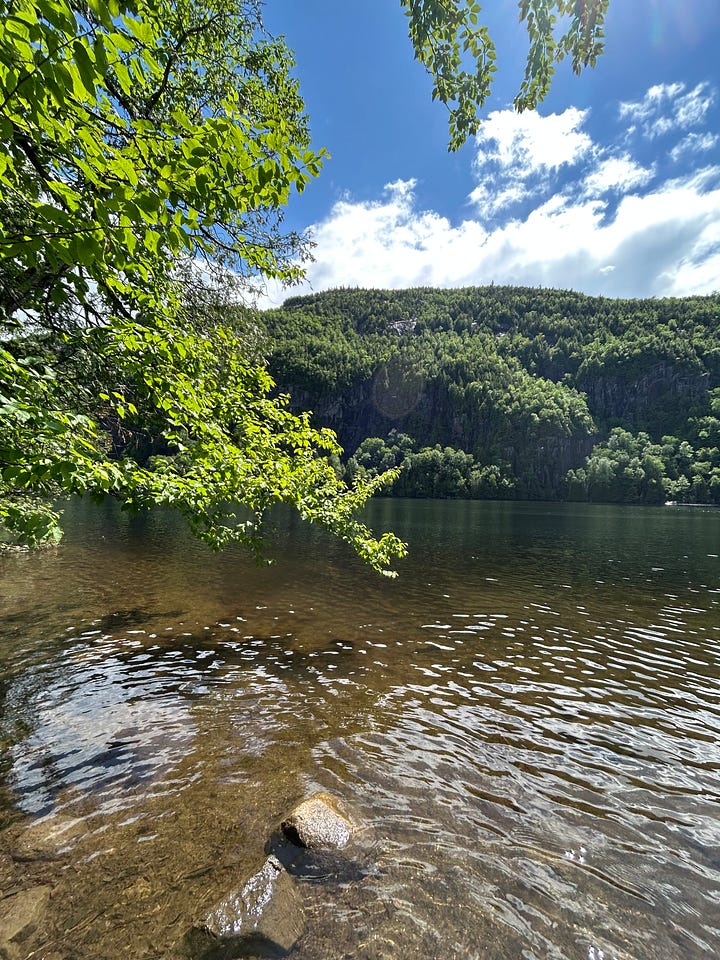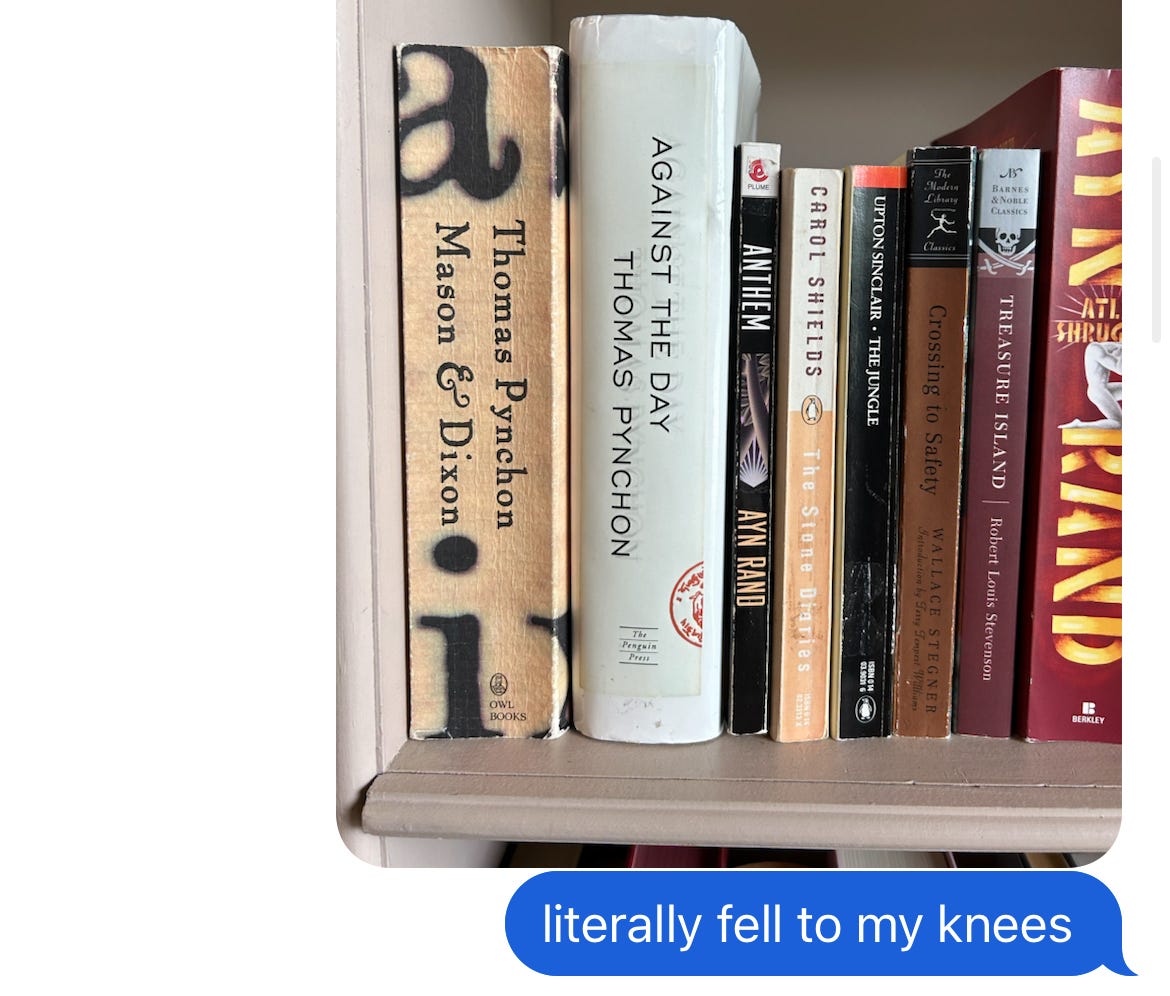I’ve been in the woods writing my book. Before that I was in Spain and then in Sardinia not thinking about my book or much else at all besides beach olives anchovy pan con tomate wine sardine pasta aperol spritz. Before that I was in Florida and before that I was in LA for six weeks because I couldn’t stand to be in my apartment. I was briefly in Mississippi. Before that I was in San Antonio and then San Diego and then Pittsburgh. But for the past two and a half weeks I’ve been in the woods writing my book. It is going fine at best. I don’t want to talk about it.
I’m at a residency in the Adirondacks. I am on a farm. There are sheep and chickens and pigs. I do not like the chickens, I love the sheep, I tolerate the pigs. There are ceramicists here and poets and novelists too. They are all wonderful and talented and fun and sometimes we go swimming in the very cold pond or the very cold waterfall. I don’t have a car so I just tag along whenever someone says they’re going somewhere, which means I never know when I’ll go swimming or hiking, it just happens to me sometimes. I don’t like asking people to drive me places but I did ask someone to drive me to the Keene Valley Library after the Keene Library—confusing, I know—didn’t have the book I was looking for.
When I was in Florida I started reading The House of Mirth because I was reading a book about the railroad so I could write a paragraph or two about the Pacific Railroad surveys in the first chapter of my book. “How does the railroad relate to ecofascism” you may ask. To that I say: if you buy my book in 2027 you’ll find out. I was reading the House of Mirth because it’s thematic reading summer. It was supposed to be My Year Of Thematic Reading but I had some personal turmoil in the winter and early spring that rendered me basically illiterate so now it’s thematic reading summer.
Anyway. I was reading The House of Mirth because it’s at least a little bit about financial speculation, which is related enough to the railroads that I decided it fits into thematic reading summer. I got about halfway through but forgot the book at my parents’ house, which is funny because last summer I went to see The House of Mirth at the Museum of the Moving Image with Lari and Jocelyn and Nancy and Austyn and the movie cut out about halfway through. They tried to fix it but they couldn’t and we left and got, I think, maybe, Uzbek food? Or something. After I left the book at my parents’ house I panicked because I thought I’d never find out what happens to Lily Bart, at least not in the time that I’m in the woods writing my book. And then I found a copy at the Keene Valley Library and now here we are.


Thematic reading summer is my way of letting myself read fiction again. Last year I hardly read any novels because I spent all my free time reading books from academic presses about the railroad buffalo allotment the Great Plains land theft wilderness national parks the world’s fair conservation overpopulation redwoods the Sierra Club etc. It was necessary and I enjoyed it but sometimes I just want someone to tell me a little story. Sometimes I want to read a beautiful sentence! Academics, God bless them, are not known for writing beautiful sentences.1
So: thematic reading summer. I am allowing myself novels but only if they are in some way thematically related to my research, which means I’m allowed to read novels that are in some way about the railroad buffalo allotment the Great Plains land theft wilderness national parks the world’s fair conservation overpopulation redwoods the Sierra Club etc. This has made me revisit authors I love, like Edith Wharton, and has also forced me to branch out. I read a horror novel, which is not something I usually do. And I enjoyed it! Without further ado, and with no further commentary, here is what I have read thus far during thematic reading summer (and also spring and early winter but just a little bit):
The Vaster Wilds by Lauren Groff
To Save the Man by John Sayles
Gilead by Marilynne Robinson
The Buffalo Hunter Hunter by Stephen Graham Jones
Wandering Stars by Tommy Orange
The Magnificent Ambersons by Booth Tarkington
Trust by Hernan Diaz
The House of Mirth by Edith Wharton
In the Distance by Hernan Diaz
I liked some of these and didn’t like others very much but I don’t feel like talking about it right now even though I will say In the Distance is the best book I’ve read in years. I am currently reading O Pioneers! and when I’m done with that I might read The Song of the Lark or I might read Against the Day, because LA roommate Paul and I are also doing Pynchon Summer. I looked for Against the Day in nine different bookstores across three states and two countries—Skylight, Stories, and the Grove Barnes & Noble in LA; Mojo Books and two different Barnes & Noble locations in Tampa; an English-language bookstore in Barcelona whose name I forget; a bookstore in Saranac Lake whose name I also forget; Snowfort Books in Westport, New York. At a certain point people started telling me to just order online but I felt like it had to find me. And then I found it at the other bookstore in Westport, which I believe is called The Inn.
There are other books on my list but the point of this meandering, far too personal post is to ask: do you—yes, you!—have any recommendations for novels that are in some way about the railroad buffalo allotment the Great Plains land theft wilderness national parks the world’s fair conservation overpopulation redwoods the Sierra Club etc. Story collections are good too. Poetry, even. Do NOT say The Overstory, I don’t want to read it. And don’t say Lonesome Dove or anything by Cormac McCarthy because yeah, duh, I know!
thank you love you bye <3
and yet some of them do. Shoutout to Elliott West!!!!!!!





A great plains-related story collection I enjoyed: A Gravestone Made of Wheat and Other Stories, by Will Weaver.
hernan diaz is so good. i recently wrote a long essay here about trust as well as the moneychangers, a book by upton sinclair that certainly inspired hernan diaz (confirmed by a lithub interview he did that i found after finishing both books and being like huh these are veryyy similar). it’s really short and is explicitly about a railroad speculation scheme that goes awry, based very explicitly on a similar scheme that went awry and caused the panic of 1907. so anyway i’d totally recommend reading the moneychangers.